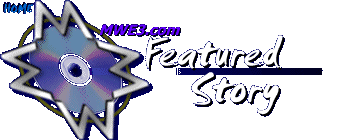Chance Of A Lifetime...
an interview
with DWIGHT TWILLEY
Recording at his Big Oak studio in Tulsa, pop legend Dwight Twilley
released 47 Moons late in 2004 on his new label
home, DMI (Digital Musicworks International). For his first album
album of new material since his 2001 album The Luck, Twilley
reunites with long time guitarist Bill Pitcock IV, adding “After
the release of The Luck, we spent a lot of time building and
equipping our own recording studio. The hard work was worth it. With
my wife Jan engineering and my good friends Bill Pitcock IV and Jerry
Naifeh only a phone call away, I had never felt so self contained
and in control of my art.” Going back to his mid ‘70s albums
on Shelter and his early ‘80s releases on EMI, Twilley was often
regarded as one of the most gifted pop songwriters of a generation
and he fulfills his musical destiny in 2004 with 47 Moons. For
sheer pop pleasure, it just doesn’t get any better than 47
Moons. Dwight Twilley spoke with Robert Silverstein on February
14, 2005 about the new CD.
2005
was a strange, scary year that found innovator, near forgotten ‘60s
U.K. rock bands like Stackridge and The Syn, releasing dazzling comebacks.
One of the great American music comebacks of that late 2004 / early
2005 period had to be the release of 47 Moons by long time power pop
rock icon Dwight Twilley. A follow up studio album, Dwight says, is
in the can so to speak. In the time between, Dwight and long time
Twilley guitarist Bill Pitcock IV keep fans happy with an early 2009
covers album tribute CD entitled Out Of The Box—the first of
hopefully more of these kind of albums from Dwight. In this first
ever web site publishing of the entire interview, MWE3.com remembers
speaking to Dwight Twilley and his guitarist, Bill Pitcock IV about
47 Moons in February 2005.
The following interview first appeared in the April 2005 issue
of 20th Century Guitar magazine. MWE3.com now presents the complete
edition of Robert Silverstein’s interview with Dwight Twilley
recorded on February 14, 2005
- editor September 30th, 2009
MWE3: Dwight! It’s Robert from 20th Century Guitar magazine and
mwe3.com.
DT: Hey Robert, how you been?
MWE3: Congratulations on 47 Moons. You’ve said the planets
aligned for you regarding making this album. What about DMI did you
like as a label and how did it finally come together regarding making
the new CD?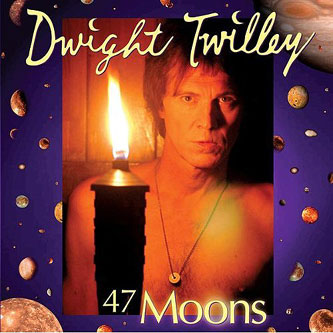
DT: They approached us. Kind of from out of the blue, contacted us.
It was pretty much, I think, around this time last year. We were very
interested in their whole content towards marketing and their whole
vision of the digital world. And especially since, things like...I
mean it’s kind of obvious that the major labels have been floundering
for some time. Radio became so formatted and niched. Their whole idea
toward promoting music really appealed to us. And we just got to meet
them, all the people at the company, and really liked the people involved.
It seemed like they were putting together a really good team and it
just almost seemed like perfect little match for us.
MWE3: So 47 Moons is your first album of new music since Tulsa?
DT: Yeah, it really is. We were kind of threatened by Tulsa
in a way. Sonically, it’s nowhere near 47 Moons, I
don’t believe. But as far as the material, just the song lines,
it was kind of a challenge to us. We felt anyway like it was kind
of hard to live up to the collection of material but once we got five
or six songs in we felt pretty confident.
MWE3: Could you say something about the studio and how 47 Moons
was recorded?
DT: A lot of people that went Pro-tools over the last few years, you
know they rushed out and got all the equipment and seemed to almost
brag about the fact that they could record in their living rooms.
That was never our concept. We spent a lot of time putting together
our room. We built it from the ground up. And so it took us a little
longer (laughter) than other people but as end result what we have
is our little magical laboratory. And we’re very safe and comfortable
out there. In fact, since the record has been finished, you know we’re
nervous about going out in the world (laughter) ‘cause we feel
so safe in our magic box. And like a lot of people, we just walked
into the world of pro-tools and when we began, once we had our room
the way we liked it and we started organizing the equipment we sat
in front of the pro-tools unit for about three days and waited for
it to make a noise (laughter), literally. I think it was about three
days in and we finally heard this little (ch sound)... It’s alive!
(laughter) And then there were the people that said this was a whole
new technology you need to learn and stuff. And of course, there was
no concept of that. We just immediately began recording.
MWE3: Have the advances in technology made recording easier for you?
DT: For someone like me, yes. I was in the crowd of people that went
kicking and fighting with analog and the reel to reel machines. ‘Cause
I know so many of the tricks. I’d done it for so long that I
just couldn’t imagine that I could actually...that there wouldn’t
really be a board, there would be a screen. That there would actually
be no tape. But now I would never go back. Someone like me, with the
amount of number of vocals that I do and layering of guitars and things
like that, it’s not just easier, it really opens up a lot of
doors so you can do things faster to find out if you’re getting
the right result. And there’s just a lot of things you just couldn’t
do before, so the few tricks that you used to be able to do with tape
that you have to give up, you win back two or three more in their
place. So, it’s very nice. And on this record too, since it’s
our own little world no one can tell us to stop recording or when
to record...of course we’re very addicted by it.
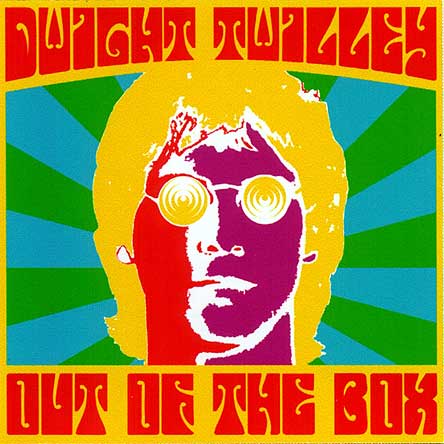 MWE3:
You can record at five in the morning!
MWE3:
You can record at five in the morning!
DT: Absolutely. I’m sure you see in the credits that my wife
engineered it.
MWE3: You and Bill Pitcock make a potent guitar team on the new album.
He really nails it.
DT: Absolutely. He always does. (laughter) I really just used two
guitars. For electric I use a Fender G&L Asat. And then my acoustic
that I’ve been using since 1977 is a Gibson J-160E custom. That’s
really been my workhorse throughout the years. It looks pretty terrible
but it sounds awfully good! (laughter) It’s got the battle scars.
MWE3: The Gibson...?
DT: Oh, total. Finally, actually, since I’m starting to think
about doing shows. And finally this year I finally decided it’s
time to retire the Gibson because I just can’t take the chance
of taking it out on the road having it get lost or stolen or damaged.
It’s just one of those guitars, you can leave it alone for a
month and you pull it out of the case and it’s totally in tune.
MWE3: How about a Dwight Twilley signature model?
DT: (laughter) There was one actually made. Back in ‘79, I think.
Somebody made a custom Dwight Twilley guitar and it was the first
wireless, cordless guitar. And it was funny, because I’m like
a songwriter, get-the-feel kind of guy. This thing was more designed
for somebody like Pitcock. It looked like a Japanese coffee table.
It had like nine hundred different kinds of pickups and every feature
that you could imagine. It was just a beautiful guitar. They were
just getting ready to do the deal on it. I had the prototype I guess.
The funny thing was, the people that built it...there was something
wrong with the wireless system in it, I forget what it was, so we
sent it back to the person who built the guitar and his shop was burglarized
and it was stolen. So somewhere out there in the world there’s
a Twilley signature model guitar. It even had my logo. Twilley, the
star in gold.
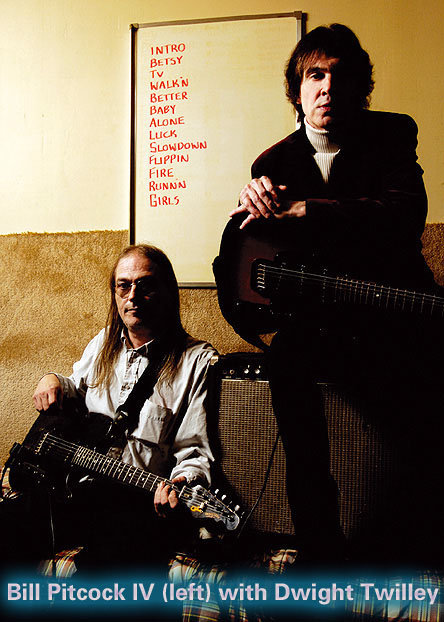 MWE3:
How about Bill’s guitars?
MWE3:
How about Bill’s guitars?
DT: I know he uses a Fender. And he also uses a guitar processor,
which he’s, what would be the word... well versed with. He plays
bass with that a lot of times and even pianos and strings and stuff
MWE3: I want to ask you later about the song classic “Chance
Of A Lifetime” but for the most part, when was the music on 47
Moons written?
DT: Most of the stuff is new. When I do any record it’s the same
thing. I’ve got so many songs. I have quite a little catalog
of songs and it’s always real important to me, as we were discussing,
like living up to the song quality of Tulsa. I don’t like
to make an album that sounds like the same song over and over again,
different versions of the same song. So a lot of times what I’ll
do is, after I write two or three brand new songs in a row I’ll
go back into my treasure chest and look for things that I wrote five,
ten years ago, or longer, and update them. And they seem to have a
freshness. It’s almost like somebody else wrote them. Or I practically
forgot about them. Sometimes people suggest songs. They go, ‘hey
man, remember this?’ That song in particular, I submitted for
a film and had a female vocalist singing it with different lyrics.
MWE3: You’re talking “Chance Of A Lifetime”?
DT: Uh-huh. And while I was doing that, well it kind of struck everybody
was just, ‘man, that’s a good song’. It would be kind
of nice if I did that. ‘Cause it was a little hit in Europe for
a girl named Marti Jones.
MWE3: One of the great singers of the ‘80s. That song was on
her Match Game album. You wrote that song. I remember Marti
did a great job on her version back in 1986 or so.
DT: The truth is, back when I wrote that song, I demo-d it, I had
Susan Cowsill sing it. She had a much more uptempo...or our version
was much more uptempo and rockin’ than the one that Marti Jones
did. I like Marti Jones’ version, but there was still kind of
like unfinished business there. (laughter) So when we were recording
this little demo for this film...I really wasn’t sure, ‘cause
it was written with the female aspect and for a female voice, so it
was a little bit demanding vocally. (laughter) So I wasn’t quite
sure if I could pull it off, but I got lucky.
MWE3: The album takes no prisoners and starts off with, “Better
Watch Out” with some pretty charged up lyrics. Was there anything
political about that one?
DT: No, it was really more the case of, for me, when I get into making
a record, it’s a lot of times that the record starts demanding
what you do. You get two or three songs going and suddenly you notice
that there’s something missing and in the midst of the things
that I was doing, some of the first things that I started out with,
like the title track, just kind of in that one little area, one kind
of little thought pattern. And “Better Watch Out” was kind
of the result of listening to six or seven of the tracks nearing completion
and going, ‘you know what? We need something here that’s
sinister, upbeat and sexual.’ And really the origin of that song
was something that the album itself demanded from me.
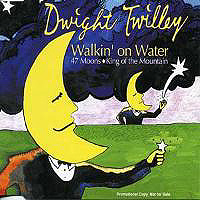 MWE3:
The title song “47 Moons” is a masterpiece of Beatles style
symphonic pop.
MWE3:
The title song “47 Moons” is a masterpiece of Beatles style
symphonic pop.
DT: (laughter) We knew it was a special song. When we first cut it
in a rough form several people came over and, without us really paying
much attention to it...we’d just be playing and playing back
and someone would walk in the room and there were several people that
were moved to tears. And the interesting thing was that we kind of
discovered that people interpreted the song in so many different ways
that I would now kind of stand back and be real hesitant to even point
out where I was coming from with the song because it might interfere
with other people’s fantasies.
MWE3: The song is very lyrical so I was surprised to find the album
had no lyric sheet.
DT: We had lyrics. I think it was just a record company decision.
Was there really room for it, ‘cause they would be so small.
CDs are so small these days. There are quite a bit of lyrics on this
album so I think it was just a matter of logistics. Hopefully they’re
clear enough so they’re easily understood.
MWE3: On the album’s single, “Walkin’ On Water”,
it’s clear the guitar parts you and Bill play on the album were
very much structured like George Harrison would do in The Beatles.
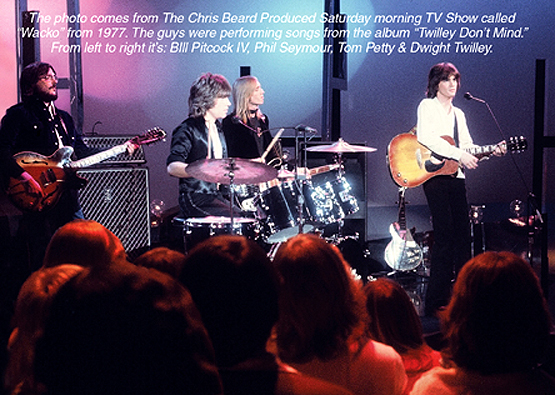 DT:
That’s just the sound I grew up with. I grew up waiting at the
record store for the new Beatles album to show up. I just took a little
left turn in my early teens when I had the opportunity to spend some
time in Tupelo, Mississippi with Ray Harris, who was an early Sun
artist. I was raised with The Beatles but ended up being, at a later
date, influenced by Elvis at the same time. Part of it (was) taking
the time that we were able to take. ‘Cause it was kind of like
our baby. We were making a special record for us. As far as guitars
are concerned, like for instance, on “47 Moons”, the acoustics
your hear are eight tracks of acoustics. Two tracks close mic with
the ‘58 and then I did two tracks about ten feet away from the
microphone. Then I did two tracks where I just played the acoustic
with my hands, without a pick, just lightly brushing it. Then I did
another two tracks probably like ten feet away from a vocal mic with
echo on it, and then mixed all eight tracks together down to two.
So it’s that kind of thing that you can do, when you’ve
got your own laboratory, you’ve got the luxury. You don’t
necessarily want to spend that time if you’re on somebody else’s
clock, like with the big labels and the big studio, with the big producer...(laughter)
But in our little world, we have the luxury to do things like that
on every level. And a lot of the guitars that are Bill are actually
up to twelve tracks. We’d go through and then edit them down.
DT:
That’s just the sound I grew up with. I grew up waiting at the
record store for the new Beatles album to show up. I just took a little
left turn in my early teens when I had the opportunity to spend some
time in Tupelo, Mississippi with Ray Harris, who was an early Sun
artist. I was raised with The Beatles but ended up being, at a later
date, influenced by Elvis at the same time. Part of it (was) taking
the time that we were able to take. ‘Cause it was kind of like
our baby. We were making a special record for us. As far as guitars
are concerned, like for instance, on “47 Moons”, the acoustics
your hear are eight tracks of acoustics. Two tracks close mic with
the ‘58 and then I did two tracks about ten feet away from the
microphone. Then I did two tracks where I just played the acoustic
with my hands, without a pick, just lightly brushing it. Then I did
another two tracks probably like ten feet away from a vocal mic with
echo on it, and then mixed all eight tracks together down to two.
So it’s that kind of thing that you can do, when you’ve
got your own laboratory, you’ve got the luxury. You don’t
necessarily want to spend that time if you’re on somebody else’s
clock, like with the big labels and the big studio, with the big producer...(laughter)
But in our little world, we have the luxury to do things like that
on every level. And a lot of the guitars that are Bill are actually
up to twelve tracks. We’d go through and then edit them down.
MWE3: 47 Moons sounds great with all the overdubbing...
DT: Absolutely. Also if you consider the fact that I’m singing
all the vocals.
MWE3: So how many vocal tracks would you say are on the song “47
Moons”?
DT: Oh, for the love of God...(laughter) I don’t know where to
begin! I know that when we did “Chance Of A Lifetime”, that
somebody calculated there were twenty four tracks of vocals. On a
whole record, we used to work on a twenty four track machine! That
would literally be every track on the machine.
MWE3: “Runaway With You” is another killer song with a great
late period Beatles type vibe.
DT: That’s actually my favorite track on the record. To me, it’s
just a great fantasy, to literally run away. Especially in today’s
world, talk about political. The line is, “I just want to close
my eyes and drive.” (laughter) I think all of us would kind of
like to close our eyes and drive sometimes. Turn off CNN and close
your eyes and drive. Some of the fans have picked up on fact that
I use a little snippet of a song from the album Twilley Don’t
Mind, “Trying To Find My Baby”, in that song, which
is another drive your car type song. If you listen in the instrumental
it hints back at the riff of that song from Twilley Don’t
Mind.
MWE3: Although “Ice Captain” is still maybe my favorite
song on the album. I remember playing it a lot during the blizzard
we had here in NYC last month.
DT: (laughter) Well, that was definitely the engineers favorite.
MWE3: Another Beatle-esque moment on 47 Moons.
DT: Absolutely. There’s certainly nothing insulting about
that. “Ice Captain” has been around for a while. It’s
one those songs when the band gets together, you just kind of play
it, and just never got around to recording it. There’s even an
accompanying piece of art to that song. He’s just a magical character
that just needed come and have a place on 47 Moons. (laughter)
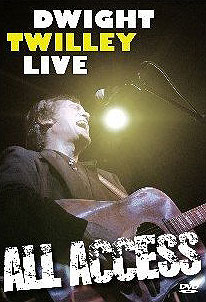 MWE3:
How about “Jackie Naked In The Window”? That almost has
a Brian Wilson kind of harmonic structure. That’s a good example
of you and Bill rocking out on guitars. That’s pure rock energy...
MWE3:
How about “Jackie Naked In The Window”? That almost has
a Brian Wilson kind of harmonic structure. That’s a good example
of you and Bill rocking out on guitars. That’s pure rock energy...
DT: Right. The thing is, I’ve been writing songs for quite a
while and it comes really easy for me. The thing that’s the challenge
is the idea behind the song. I’m constantly like looking...just
like when I was listening on late night, to one of those talk shows
where they talk about UFOs and Zombies. Some scientist just blurted
out that Jupiter has forty seven moons, so I just thought immediately,
‘now that’s a song title.’ There was an occasion when
my wife was getting ready to take a nap. And she was getting in bed
and we were just having a chitchat conversation and she just asked
me could I close the blinds ‘cause she didn’t want someone
to see her naked in the window. So I stopped in my tracks and said,
‘naked in the window.’ (laughter) She knows when I say that,
that means it’s a song title. That’s a perfect fantasy.
I’ve never seen anybody naked in the window but I know it’s
a great fantasy. We went on to talk about needing to get dog food
or something, pay some bill or do something, and a few minutes later
she mentioned that one of our friends, Jackie had called. And I just
thought to myself, ‘Jackie, naked in the window’, it’s
perfect.
MWE3: Could you say something about your early musical influences?
What came first guitars or keyboards and can you remember your first
guitar?
DT: Brian Wilson too and a lot of people. Definitely Elvis and The
Beatles were my main driving force. We were the kind of guys that,
like a lot of people that do this kind of music, thought that The
Beatles invented rock and roll and Elvis was a guy in movies. I think
the thing that set myself and the Dwight Twilley Band apart from other
people that just followed like soldiers behind everything that The
Beatles did is that we just kind of got that added last minute influence
from the earlier, other side of rock and roll. And that’s partially
what ingrained in the importance of echo with it.
MWE3: What The Beatles did you mean?
DT: More with Elvis.
MWE3: Can you remember your first guitar?
DT: Absolutely. (laughter) It was a Stella! The guitar you could get
at Sears for like twenty nine dollars. And it was my little brothers.
I found it abandoned in the closet. He’d lost interest in it
so I yanked it out of the closet and I thought it’d be a cool
thing to play Beatles songs. Then I discovered that I couldn’t
play Beatles songs (laughter) ‘cause I didn’t know enough
chords. And so the obvious next step was to write my own songs, so
I could play ‘em. I was about fifteen at the time and that was
the beginning of my song writing career.
MWE3: Any future album plans or you mentioned a possible tour.
DT: I will always be recording. (laughter) I cannot be stopped from
recording. The first show, we’re going to be doing South By Southwest.
We’re in rehearsals for that right now and then it’s kind
of a wait and see where we wanna go and what we’re gonna do.
And there is some discussion about a live record.
MWE3: I also enjoyed your Have A Twilley Christmas CD Ep. Especially
the song “Christmas With The Martians”.
DT: It’s an Ep that was released this past holiday season, but
next year it’ll be the full album, which we’ve completed.
It’s a ten song package. The concept behind it is, we were really
trying to make a, I don’t know if you know this from listening
to the Ep, is we were trying to make every Christmas song a different
kind of Christmas song. “Christmas Stars” was like a folk-y
type thing, and then you had your “Rockabilly Christmas Ball”,
then you have your full-on novelty “Christmas With The Martians”,
your dreamy ballad and your rock and roll song. And then you had your
kind of ‘40s children, “Santa Claus Favorite Christmas”.
So we finished it off, we did a dance track called “The Santa
Claus Walk”, a Christmas lullaby. Kind of a Spector / Brian Wilson
meets John Lennon track called “Snowman Magic”. So we think
it’s going to be a nice little package for next year. We were
really quite pleased with the response.
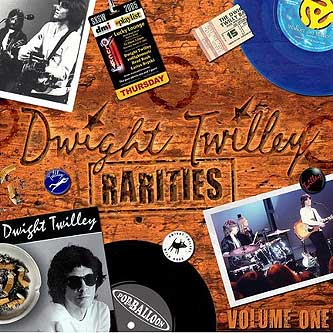 MWE3:
Some of the Christmas Ep tracks sound like they could have been on
the 47 Moons album.
MWE3:
Some of the Christmas Ep tracks sound like they could have been on
the 47 Moons album.
DT: Right, well we’ve done quite a bit of work in this last time
period, so it’s almost like we’ve actually recorded two
albums. ‘Cause we’ve done the 47 Moons plus the full
Christmas album.
MWE3: So when are you going to get a Grammy?
DT: What’s that? I don’t know...(laughter) I’m hoping
that it will get out there in the world enough at least for people
to be aware of it.
MWE3: So you like Tulsa more than living out in L.A.?
DT: Oh, absolutely. I’ve done so much more work since I’ve
been here. It took an earthquake to get me out of L.A. It turned out
to be the best thing that ever happened to me. There are a lot of
great players here too.
MWE3: I remember the tall trees of Oklahoma.
DT: Yeah, the gorgeous big leaf trees, rolling hills. It’s beautiful.
MWE3: Thanks for all the great music over the years.
DT: Absolutely. Thank you.
Bill Pitcock IV interview: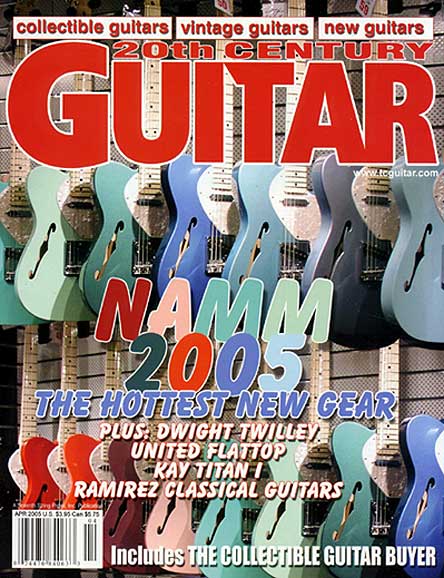
MWE3: Bill, could you say something about making 47 Moons with Dwight.
He calls it a sonic leap forward. Could you say something about recording
and tracking the guitars on the album and maybe one or two of your
favorite songs or guitar parts from 47 Moons?
BPIV: As you probably know this CD was recorded on a MAC with pro
tools which means more tracks are available than in most studios.
This gave Dwight and me the advantage of splitting guitar parts up
into different parts so we could put them down quicker and easier
than in the past. In most cases I was hearing unfinished material
for the first time when I arrived at the session and really never
heard it again because at each session we worked on different songs
and parts. We are preparing an arrangement for "You Better Watch
Out" for the live show so I actually heard that one and it sounds
pretty good to me.
MWE3: Could you say something about the guitars and amps you featured
on the CD? How about your favorite guitars through the years?
BPIV: The only guitar I used on this CD was my G&L Broadcaster
which is the only electric guitar I have played since the mid 80's
when I bought it. It's easy to carry and fits my hand well. The Broadcaster
is capable of producing a good variety of sounds. My amp is a Music
Man HD 130, two 12" speakers, 130 watts two channels pretty much
the same as a Fender Twin, which is what Dwight uses. Sometimes I
used Dwight's amp when we didn't want to unload mine. I also use a
Roland GR-1 guitar synth which makes all kinds of instruments such
as keyboards and strings and horns and other noises. Over the years
I have used lots of different guitars. For a long time I played a
'67 Fender Telecaster and a Rickenbacker mono hollow body 12 string.
Then for about ten years in the late 70's I play a Gibson 335 and
then I got the Broadcaster. I also play a Gibson acoustic which has
no name and is only identified as model 404 number 9. I bought it
when I was 19 and have used it for acoustic playing ever since.
MWE3: Could you say something about your musical and guitar background
and working with Dwight all these years and how you think it has influenced
your guitar playing?
BPIV: I was born into a musical family so when I began playing guitar
I studied privately with professional musicians from the big band
jazz era so I learned relatively quickly about how music worked as
far as basic theory and chord progressions and so on. So I progressed
into rock bands and acid rock trios and and so on until I was a senior
in high school and was working in a band with Phil Seymour, who introduced
me to his friend Dwight and the rest as they say is history. Through
working with Dwight over the years I have had a lot of opportunities
to go places and meet people which of course has been primarily on
a sound stage or in a studio. Work at that level is different than
any normal performing situation. Studio work demands technique and
imagination in order to create and record the arrangements. Of course
when all else fails we have been known to make it up as we go along.
Thanks to Dwight Twilley, Bill PitcockIV and Jan Twilley @ www.dwighttwilley.com
and Mark Pucci @ www.markpuccimedia.com
